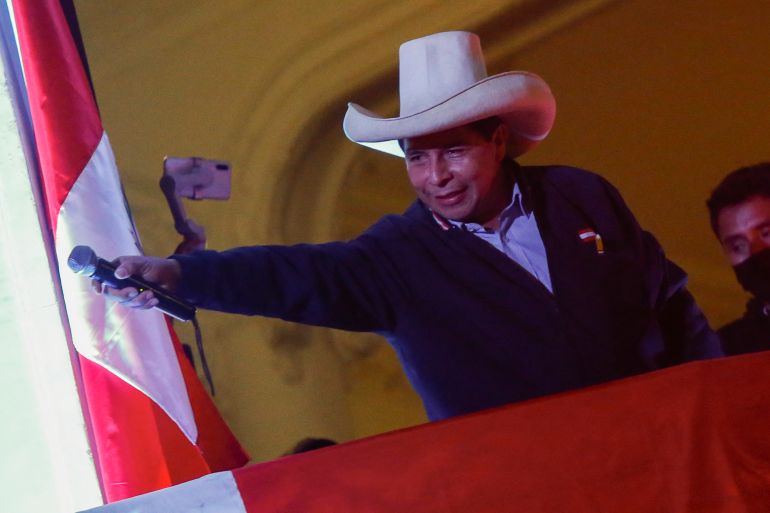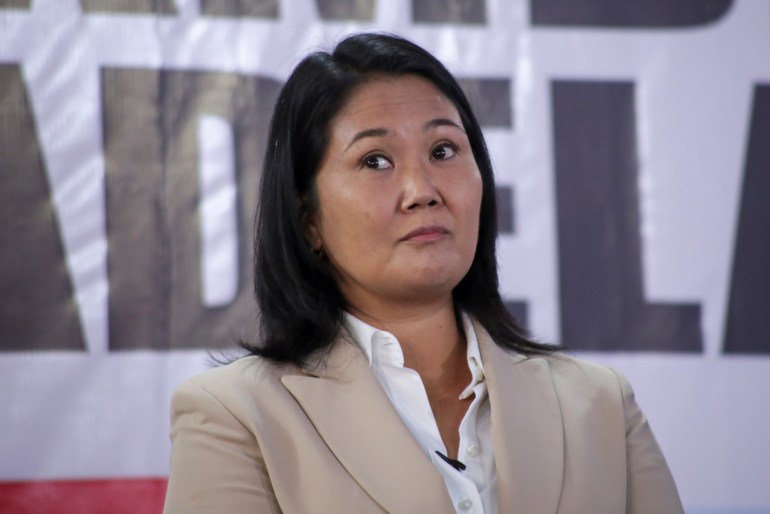As Castillo nears victory, Peru prepares for what comes next
Left-wing presidential contender Pedro Castillo keeps slim lead over Keiko Fujimori, but official result not yet released.

Lima, Peru – The official result has yet to be declared but Pedro Castillo appears all but certain to be Peru’s next president.
The radical-left outsider will face an uphill struggle to unite the bitterly divided Andean nation, however, and the most urgent question will be whether he moderates his politics or insists on the Marxist policies in his Free Peru party manifesto.
Keep reading
list of 4 itemsDeeply divided Peru awaits final results of presidential vote
Peru heads to the polls to elect president in polarised race
Peru’s COVID crisis: ‘Almost all Peruvians know someone who died’
Those proposals include making Peru’s vast mining sector leave 70 percent of its profits in the country, nationalising the media, and spending 20 percent of gross domestic product (GDP) on education and healthcare – more than the country has ever raised in tax revenues.
With all of the 18.8 million votes cast in the June 6 presidential runoff now counted, Castillo has 50.15 percent support, giving him a razor-thin lead of just more than 50,000 votes against his hard-right opponent Keiko Fujimori, daughter of the jailed 1990s president Alberto Fujimori.
She has cried fraud – despite international observers giving the elections a clean bill of health – and this week hired some of Lima’s top lawyers in an attempt to annul 200,000 votes, mainly from impoverished rural areas in the Andes and Amazon where Castillo won overwhelmingly, in some cases with more than 80 percent support.
But Fujimori’s effort, which is unprecedented in Peruvian electoral history and has delayed the official declaration of a winner, appears to have failed.
Peru’s National Electoral Tribunal (JNA, according to its Spanish acronym) ruled on Friday that most of her challenges had come after the legal deadline. There are now just less than 40,000 votes still in play, not enough to overturn the result.
Deeply polarised
Nevertheless, the last-ditch effort by Fujimori, 46, who faces trial and a potentially lengthy jail sentence for alleged money laundering, has further polarised Peru after the divisive presidential campaign.
Many commentators have noted how her legal team, made up largely of white lawyers, was effectively attempting to disenfranchise Indigenous and mixed race voters.
“It’s part of our political and legal culture, all this paperwork,” Arturo Maldonado, a political scientist at the Pontifical Catholic University of Peru, told Al Jazeera. “This is a candidate who has everything to lose and is using these tricks to win in the tribunal what she couldn’t do on the pitch.”
Fujimori’s refusal to concede has likely also increased the challenges Castillo, 51, a provincial schoolteacher and union leader, will face to establish his legitimacy in office.

The two deeply unpopular candidates received just 13 percent and 19 percent, respectively, in the crowded first round, and the runoff was viewed by most Peruvians as a vote for the candidate deemed the lesser of two evils.
With no experience in public office, and having frequently contradicted himself on the campaign trail, Castillo will face a splintered and right-leaning incoming Congress that is unlikely to sign off on his economic plans, especially any nationalisations.
He will also face the risk of impeachment, with or without cause. The outgoing Congress established that precedent last November when it removed then-President Martín Vizcarra from office on the basis of corruption allegations that were not just unproven but had yet to be seriously investigated.
“It’s possible Castillo just turns his back on Congress and tries to govern by plebiscite,” said Maldonado.
Anti-corruption effort
Another key question will be how Castillo approaches Peru’s anti-corruption fight.
Two cases will serve as early litmus tests. The first is Keiko Fujimori’s, in which prosecutors are demanding a 31-year sentence on money laundering charges that she denies, while the second is that of Vladimir Cerrón, the former regional governor and Cuban-educated surgeon who founded Free Peru.
Cerrón had picked the little-known Castillo to replace him on the presidential ticket after he was barred from running for the presidency because of a corruption conviction. On Thursday, a court controversially overturned his conviction and four-year suspended sentence. The judge is now being investigated, and Cerrón, who many Peruvians believe will be the backseat driver in the Castillo administration, faces half a dozen more corruption investigations.
Cerrón frequently made controversial comments suggesting he, not Castillo, was leading the campaign. The presidential candidate sought to play that down, however, insisting in one instance that his mentor would not even be hired as a “janitor” in his administration.
“Castillo needs to do much more to clearly distance himself from Cerrón,” said Samuel Rotta, who heads the Peruvian chapter of Transparency International. “His presidency could depend on it, but so could his anti-corruption strategy.”
Hope for ‘enlightenment’
Meanwhile, the mood has been tense in Peru as the country waits for the final result. The legal challenges are expected to run into next week, delaying the start of the transition as the coronavirus pandemic continues to sweep the country.
Fujimori supporters were picketing the offices of the electoral agency, ONPE, and the homes of the head of the JNE and ONPE. Interim President Francisco Sagasti has called on both sides to avoid declaring victory before the official result is announced, prompting some lawmakers to even suggest censuring him for supposedly being biased against Fujimori.
Anna Luisa Burga, 46, a historian from Castillo’s native Cajamarca who now lives in Lima, summed up the mood of many Peruvians who had reluctantly voted for Castillo and are now hoping that the untested apparent new president-elect will be able to rise to his enormous new responsibilities.
“I didn’t vote for him in the first round, and I wasn’t going to vote for him in the second round, but then came this wave of racism, classism and discrimination, and I decided it was important, including for the symbolism, to have a president like Castillo,” she told Al Jazeera.
“I still have my doubts, and I think it is going to be very difficult for him. But I just hope for his enlightenment, and that he surrounds himself with good people.”